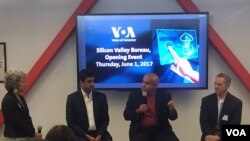A lively debate between a congressman, an entrepreneur and an academic was the focal point of the opening of Voice of America’s first-ever Silicon Valley bureau in San Francisco.
At the event – held June 1 among the entrepreneurs and financiers of the global incubator 500 Startups in San Francisco -- participants debated two sides of a developing argument over tech worker visas in the U.S.
“Silicon Valley is an incredibly important place for the Voice of America,” said VOA Director Amanda Bennett. “In telling America’s story, we always emphasize technology and entrepreneurship because we have found that these two topics are of great interest to our global audience.”
While some industry advocates argued the U.S. needs to continue to attract the “best and brightest” to U.S. technology companies, another expert said the government’s guest worker program chases older Americans from the industry.
Facing highly charged domestic politics over immigration, Representative Ro Khanna (CA-17), Global Innovation Catalyst chairman and founder, Kamran Elahian, and University of California at Davis professor, Dr. Norman Matloff often sharply disagreed in a panel discussion moderated by VOA Silicon Valley bureau chief, Michelle Quinn.
“We want to make sure that people who are entrepreneurs have an ability to stay here, and create their companies here, instead of creating them in India, Brazil and China,” noted Rep. Khanna. “We want to make sure that the folks who have talent in different areas are creating those jobs in the U.S.”
Dr. Matloff, who admitted his studies of the technology workforce reach conclusions that run contrary to primary opinions in the industry, called the H-1B visa program “troubled.” The H-1B is a non-immigrant visa in the United States that allows U.S. employers to temporarily employ foreign workers in specialty occupations.
“It is widely abused and used for cheap and immobile labor,” said Matloff, arguing that tech companies often bring in younger, less accomplished workers, depriving older American tech workers of jobs. “In essence, what is really going on with this program is we’re replacing more talented people with less talented people,” he said, admitting that many in Silicon Valley would disagree with his assessment.
Elahian, an immigrant from Iran and founder of 10 companies, said the U.S. needs to have policies that attract people with real abilities and see America as a beacon of hope. “The best and the brightest of the world come to this country to get a good education,” said Elahian. “It’s crazy to kick them out and not take advantage of their talents.”
500 Startups founder Dave McClure was among the tech industry representatives who joined the argument. McClure described an industry proposal that would allow foreign investors start businesses with H-1B works, if they could create 5 to 10 new U.S. jobs. “I don’t think you’re going to see much opposition to that because it’s job creation,” said McClure.
The VOA Silicon Valley bureau is in temporary quarters, but will formally open its office and studio at the Phillip Burton Federal Building and Courthouse, 450 Golden Gate Avenue, San Francisco, later this summer.





